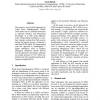250 search results - page 7 / 50 » Learning Probabilistic Models of Word Sense Disambiguation |
144
click to vote
TAL
2010
Springer
15 years 4 days ago
2010
Springer
Mihalcea [1] discusses self-training and co-training in the context of word sense disambiguation and shows that parameter optimization on individual words was important to obtain g...
119
click to vote
CIKM
2005
Springer
15 years 7 months ago
2005
Springer
This paper presents a new approach to determine the senses of words in queries by using WordNet. In our approach, noun phrases in a query are determined first. For each word in th...
112
click to vote
ECAI
2000
Springer
15 years 6 months ago
2000
Springer
Abstract. This paper describes an experimental comparison between two standard supervised learning methods, namely Naive Bayes and Exemplar–basedclassification, on the Word Sens...
112
click to vote
ACL
2004
15 years 3 months ago
2004
Supervised learning methods for WSD yield better performance than unsupervised methods. Yet the availability of clean training data for the former is still a severe challenge. In ...
111
Voted
ACL
2006
15 years 3 months ago
2006
We present a novel hybrid approach for Word Sense Disambiguation (WSD) which makes use of a relational formalism to represent instances and background knowledge. It is built using...

